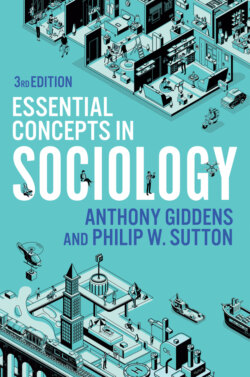Читать книгу Essential Concepts in Sociology - Anthony Giddens - Страница 62
Meaning and Interpretation
ОглавлениеCritical realism is not just a philosophy of science but also a research method that, its advocates argue, is capable of getting below the surface of observable events to gain access to the underlying causes or ‘generative mechanisms’ of real-world phenomena. It is a serious attempt to maintain the social sciences as ‘sciences’, and those who endorse it claim it is the task of scientists to uncover the underlying social processes that produce the world we experience and observe. The realists’ starting point is that human societies are part of nature and that both should be studied together using the same method. But this does not mean importing natural science methods into sociology. Instead, the realist method is said to be appropriate for both natural and social sciences.
A fundamental tenet of critical realism is that knowledge is stratified, and realists work with both abstract and concrete levels of knowledge. Abstract knowledge consists of high-level theories, such as natural science ‘laws’ or general theories of society, while concrete knowledge refers to that which is contingent in historically specific circumstances. The study of specific historical situations or ‘conjunctions’ is then required, along with detailed empirical research, in order to sort out how contingent factors interact with necessary relations to produce specific conjunctural outcomes that can be observed. In a simple example, Dickens (2004) says that gunpowder has an unstable chemical structure giving it the causal power to explode. But whether this power is triggered depends on other contingent factors – how it has been stored, whether it is linked to an ignition source and how much of it there is. Similarly, human beings have certain powers and capacities (human nature), but whether they are able to exercise these depends on historically contingent factors too: are they enabled or constrained by existing social relations, and does society provide enough opportunities for their abilities to be used?
Clearly critical realism approaches knowledge production in a different way than does social constructionism. Constructionist studies very often adopt an ‘agnostic’ stance towards the reality of a social problem such as global warming, leaving such assessments to environmental scientists and others. But realists want to bring together natural and social scientific knowledge, which should produce a better and more comprehensive understanding of global warming and its underlying causes or ‘generative mechanisms’. Some critical realists see Marx’s theory of alienation as an early realist social theory, as it links a theory of human nature to contingent factors such as the emergence of capitalist social relations, which effectively prevent humans from fully realizing their ‘species being’.
